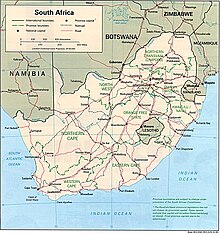Mahlabatini Declaration
| Mahlabatini Declaration of Faith | |
|---|---|
 |
|
| Created | 4 January 1974 |
| Signatories | Mangosuthu Buthelezi, Harry Schwarz |
| Purpose | Provide a blueprint for government of South Africa by consent and racial peace in a multi-racial society |
The Mahlabatini Declaration of Faith was a statement of core principles laid down by South African political leaders Mangosuthu Buthelezi and Harry Schwarz on 4 January 1974. It was signed in Mahlabatini, KwaZulu-Natal, hence its name. Its purpose was to provide a blueprint for government of South Africa by consent and racial peace in a multi-racial society, stressing opportunity for all, consultation, the federal concept, and a Bill of Rights. It also first affirmed that political change must take place though non-violent means. It was the first agreement in apartheid South Africa by acknowledged black and white political leaders that subscribed to such principles. Final negotiations, which embodied many of the Declaration's principles, took place between President F.W. de Klerk and Nelson Mandela in the early 1990s.
On 4 January 1974, Harry Schwarz, Transvaal leader of the official opposition United Party, met and had discussions with Gatsha (later Mangosuthu) Buthelezi, Chief Executive Councillor of the black homeland of KwaZulu. They jointly issued a document, which stated that "the situation of South Africa in the world scene as well as internal community relations requires, in our view, an acceptance of certain fundamental concepts for the economic, social and constitutional development of our country". It was intended for these core concepts to be the foundations for negotiations involving all in South Africa. Both leaders were acting in personal capacities.
The declaration's purpose was to provide a blueprint for government of South Africa for racial peace in South Africa. On the basis of five principles, the declaration declared a "faith in a South Africa offering equal opportunities, happiness, security, and peace for all its peoples." It called for negotiations involving all peoples, in order to draw up constitutional proposals stressing opportunity for all with a Bill of Rights to safeguard these rights.It suggested that the federal concept was the appropriate framework for such changes to take place. It also first affirmed that political change must take place through non-violent means. The concept of a non-discriminatory society had been outlined in the 'Act of Dedication' of 1973 that Schwarz had written, while Leader of the Opposition in the Transvaal. Schwarz had called for the Transvaal and South Africa to adopt and subscribe to the act. While the United Party Transvaal caucus unanimously adopted the initiative, the National Party refused for it to come to debate. The principles of the act were adopted at the 1973 National United Party Congress.
...
Wikipedia
